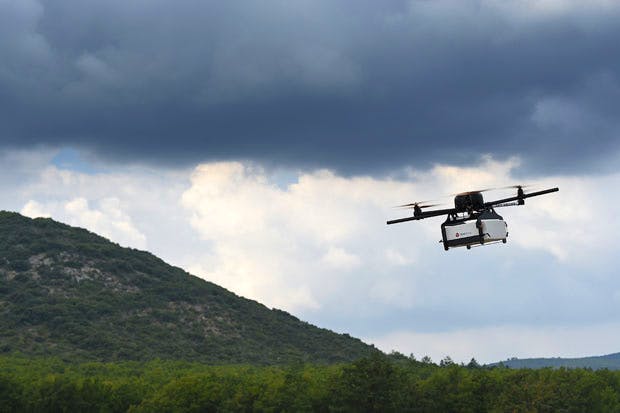The TUC general secretaryFrances O’Grady doesn’t get a lot of airtime. Compared with predecessors a generation ago, such as Vic Feather and Len Murray, she is all but invisible. But in her Congress speech at Brighton on Monday, she struck a note that must have resonated with many of the public who have no idea who she is when she spoke of ‘greedy businesses that treat workers like animals’.
She was referring to zero-hours contracts, below-minimum-wage rates such as those effectively paid at Sports Direct’s Shirebrook warehouse, and rock-bottom fees per delivery offered to self-employed Hermes parcel-van drivers and Deliveroo fast-food couriers. And of course anyone not fundamentally opposed to free markets will take issue with her choice of words. ‘Greedy’ does not apply to every firm that develops a low-cost business model which involves flexible working at market rates. The work such firms offer suits many people today, including economic migrants, who consider it an opportunity rather than a form of enslavement. To compare them to animals, as though they had no free will, is to demean them in a way the work itself does not.
Well, maybe. But Frances O’Grady has a point. Driven by globalisation, automation and the advance of the internet, the world of work and its rewards are descending into an atomistic jungle. The concept of lifetime working for a single paternalist employer is long dead; so too, in most cases, is the defined-benefit pension. Old ways of recruitment, training and promotion, whether for school leavers or graduates, have largely gone. The absence of solidarity within what might once have been called the corporate family is one reason why senior executives feel entitled to megabuck salaries that bear comparison to external peers but are wildly disproportionate to the average pay of their own workforce.
Meanwhile, employment law has become more complex, and more burdensome to traditional employers, but seems remarkably ineffective in protecting those who scrape a living as agency workers, or via gangmasters, or as self-employed contractors. Trade unions occasionally rattle the warehouse gates, but are more concerned with rearguard job protection in public services. And the ultimate threat is that the delivery biker will be replaced by a drone, the van will be driverless, and Shirebrook’s labour-intensive stock-picking system will be overtaken by the capital-intensive robotics of John Lewis, Amazon and Ocado.
So everyone who is economically active must learn to manage their own work portfolio in a buyers’ market, where relationships with employers are transient and transactional. That can be liberating if you have skills and ideas to sell, from a base of financial security. One of its corollaries is an upsurge in entrepreneurship: more youngsters than ever before are excited by the idea of starting their own businesses. But for those with low skills and no savings, the new world of work is a frightening prospect. We need a national debate about how — through education and new thinking about what constitutes socially responsible capitalism — to make it less so.
Slow progress
What’s happening with HS2? The high-speed rail project has just lost its chief executive, Simon Kirby, headhunted by Rolls-Royce at an unspecified multiple of his £750,000 HS2 salary. Rumour-mongers say the true final cost of the project is now closer to £80 billion than the official figure of £55 billion, and that chairman Sir David Higgins may not renew his contract next year. An announcement on the final route of northern spurs to Manchester and Leeds is long overdue, but there’s a huge row going on over a decision to bash through central Sheffield (demolishing a housing estate to do so) rather than via the out-of-town Meadowhall shopping centre.
Well, you might say, big infrastructure projects never run smoothly, the nation needs a radical increase in north-south rail capacity, and neither Theresa May nor the Transport Secretary Chris Grayling has given any hint of backing away. But the odds on HS2 happening in untruncated form and within our lifetimes are lengthening by the month. And if a decision came out of the blue to build HS3 instead — that’s the fast link from Manchester to Leeds or, even better, Liverpool to Hull — I suspect the north would let out a unanimous cheer.
Ladies leaving
The business world said farewell this week, at least for the time being, to two formidable ladies. Egyptian-born Dame ‘Minouche’ Shafiq resigned as a deputy governor of the Bank of England, two years into a five-year term, to become director of the LSE. A celebrity of the international monetary circuit who was once the youngest-ever vice president of the World Bank, perhaps she found the company in Threadneedle Street unstimulating: with the exception of free-thinking chief economist Andy Haldane, governor Mark Carney is otherwise surrounded by a crew that is as tight-lipped and sub-fusc as himself. At least in Mervyn King’s day there was lively infighting in the executive corridors and fireworks in the Monetary Policy Committee. Minouche’s exit makes Bank-watching duller.
The second departee is Laura Wade-Gery, the tough-cookie Marks & Spencer (and former Tesco) executive director who, at 51, has opted not to return from maternity leave. Thirty years ago she was the travelling companion of William Dalrymple, whose first book In Xanadu recalled them climbing the rocky Turkish citadel of Cis: ‘Laura seemed impervious to the heat, the exertion or the imminent danger of heart failure. At first she was impatient with me: “Oh get on with it! You should lose weight.” [But later] she began to tempt me with gentle, clucking pensioner-talk: “Oh well done, one last effort now!”’ Clearly she should turn her hand to writing textbooks on how to manage underperforming men.
Got something to add? Join the discussion and comment below.
Get 10 issues for just $10
Subscribe to The Spectator Australia today for the next 10 magazine issues, plus full online access, for just $10.















Comments
Don't miss out
Join the conversation with other Spectator Australia readers. Subscribe to leave a comment.
SUBSCRIBEAlready a subscriber? Log in